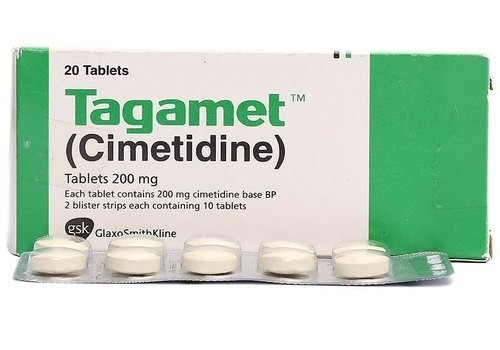
cimetidine – injection, Tagamet
Medication Uses How To Use Side Effects Precautions Drug Interactions Overdose Notes Missed Dose Storage USES: Cimetidine is used to treat ulcers of the stomach or intestines and prevent them from returning after treatment. This medication is also used to treat certain stomach and throat problems caused by too much acid (e.g., Zollinger-Ellison syndrome, erosive esophagitis) or a backward flow of stomach acid into the esophagus (gastroesophageal reflux disease-GERD).This form of cimetidine is given by injection and is used for short-term treatment of these conditions when you cannot take this medication by mouth. Your doctor should switch you to taking this medication by mouth when possible.Cimetidine injection is also used to prevent serious stomach bleeding in very ill patients (usually in the hospital/ICU).Cimetidine is known as an H2 histamine blocker. It works by reducing the amount of acid in your stomach. This effect helps heal and prevent ulcers and improves symptoms such as heartburn and stomach pain. HOW TO USE: Cimetidine is injected into a vein or muscle as directed by your doctor, usually every 6 to 8 hours. When injected into a vein, cimetidine should be given slowly over at least 5 minutes. Giving the medication too fast may cause dizziness, irregular heartbeat, or a drop in blood pressure.The dosage and length of treatment are based on your medical condition and response to treatment. The dosage in children may also be based on body weight. Do not increase your dose, use this medication more often than prescribed, or stop using it without first consulting your doctor.If you are giving this medication to yourself at home, learn all preparation and usage instructions from your health care professional. Before using, check this product visually for particles or discoloration. If either is present, do not use the liquid. Learn how to store and discard medical supplies safely.Tell your doctor if your condition persists or worsens. SIDE EFFECTS: Headache, diarrhea, dizziness, drowsiness, and pain/redness at the injection site may occur. If any of these effects persist or worsen, tell your doctor or pharmacist promptly.Remember that your doctor has prescribed this medication because he or she has judged that the benefit to you is greater than the risk of side effects. Many people using this medication do not have serious side effects.Tell your doctor right away if you have any serious side effects, including: breast tenderness/swelling, joint/muscle pain, mental/mood changes (e.g., restlessness, confusion, depression, hallucinations), trouble starting the flow of urine, easy bruising/bleeding, fainting, fast/slow/irregular heartbeat, signs of infection (e.g., fever, persistent sore throat, cough), persistent nausea/vomiting, decreased sexual ability, muscle twitching, severe stomach/abdominal pain, unusual tiredness, dark urine, change in amount of urine, yellowing skin/eyes.A very serious allergic reaction to this drug is rare. However, get medical help right away if you notice any symptoms of a serious allergic reaction, including: rash, itching/swelling (especially of the face/tongue/throat), severe dizziness, trouble breathing.This is not a complete list of possible side effects. If you notice other effects not listed above, contact your doctor or pharmacist.In the US -Call your doctor for medical advice about side effects. You may report side effects to FDA at 1-800-FDA-1088.In Canada – Call your doctor for medical advice about side effects. You may report side effects to Health Canada at 1-866-234-2345.
PRECAUTIONS: Before using cimetidine, tell your doctor or pharmacist if you are allergic to it; or to other H2 blockers (e.g., ranitidine); or if you have any other allergies. This product may contain inactive ingredients, which can cause allergic reactions or other problems. Talk to your pharmacist for more details.Before using this medication, tell your doctor or pharmacist your medical history, especially of: heart problems (e.g., irregular heartbeat), immune system problems, kidney disease, liver problems, lung diseases (e.g., chronic obstructive pulmonary disease-COPD).This drug may make you dizzy or drowsy. Do not drive, use machinery, or do any activity that requires alertness until you are sure you can perform such activities safely. Limit alcoholic beverages.Kidney function declines as you grow older. This medication is removed by the kidneys. Therefore, elderly people may be at greater risk for side effects (e.g., confusion) while using this drug.During pregnancy, this medication should be used only when clearly needed. Discuss the risks and benefits with your doctor.This medication passes into breast milk. Consult your doctor before breast-feeding. DRUG INTERACTIONS: Drug interactions may change how your medications work or increase your risk for serious side effects. This document does not contain all possible drug interactions. Keep a list of all the products you use (including prescription/nonprescription drugs and herbal products) and share it with your doctor and pharmacist. Do not start, stop, or change the dosage of any medicines without your doctor’s approval.Some products that may interact with this drug include: atazanavir, azole antifungals (e.g., itraconazole, ketoconazole), carmustine, cisapride, clopidogrel, dasatinib, dofetilide, epirubicin, metformin, moclobemide, moricizine, procainamide, quinidine, silver sulfadiazine, drugs removed from your body by certain liver enzymes (such as lidocaine, metoprolol, metronidazole, propranolol, tacrine, theophylline, warfarin, zaleplon, narcotic analgesics including codeine, tricyclic antidepressants including amitriptyline, anti-seizure drugs including carbamazepine and phenytoin, benzodiazepines including diazepam, calcium channel blockers including nifedipine).Cigarette smoking can affect this medication. Tell your doctor if you smoke and if you stop or start smoking while using this medication.This medication and similar H2 blockers (e.g., famotidine, nizatidine, ranitidine) are available both with and without a prescription. Do not use them at the same time. OVERDOSE: If overdose is suspected, contact your local poison control center or emergency room immediately. US residents can call the US National Poison Hotline at 1-800-222-1222. Canada residents can call a provincial poison control center. Symptoms of overdose may include: difficulty breathing, fast heartbeat, loss of consciousness.
NOTES: Do not share this medication with others.For best results, this medication is often used along with lifestyle changes such as stress-reduction programs, exercise, and diet changes. Talk to your health care professional about changes that might benefit you.Laboratory and/or medical tests (e.g., endoscopy, kidney function tests) may be performed to monitor your progress or check for side effects. Consult your doctor for more details. MISSED DOSE: For the best possible benefit, it is important to receive each scheduled dose of this medication as directed. If you miss a dose, contact your doctor or pharmacist immediately to establish a new dosing schedule. Do not double the dose to catch up. STORAGE: Consult the product instructions and your pharmacist for storage details. Keep all medications away from children and pets.Do not flush medications down the toilet or pour them into a drain unless instructed to do so. Properly discard this product when it is expired or no longer needed. Consult your pharmacist or local waste disposal company.
Report Problems to the Food and Drug Administration
You are encouraged to report negative side effects of prescription drugs to the FDA. Visit the FDA MedWatch website or call 1-800-FDA-1088.
Selected from data included with permission and copyrighted by First Databank, Inc. This copyrighted material has been downloaded from a licensed data provider and is not for distribution, except as may be authorized by the applicable terms of use.
CONDITIONS OF USE: The information in this database is intended to supplement, not substitute for, the expertise and judgment of healthcare professionals. The information is not intended to cover all possible uses, directions, precautions, drug interactions or adverse effects, nor should it be construed to indicate that use of particular drug is safe, appropriate or effective for you or anyone else. A healthcare professional should be consulted before taking any drug, changing any diet or commencing or discontinuing any course of treatment.


